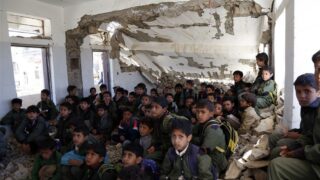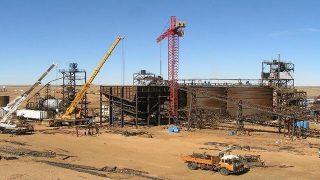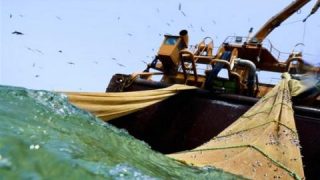During a tour in Mauritania a few days ago, representatives of Arab and international bodies were astonished by the reality of the famine people are suffering from in pastoral farming areas. The residents of these regions are still living by primitive means and drinking well water that is brought to them on donkey carts. International organizations, including some affiliated with the UN, called for providing urgent support to save more than 1 million Mauritanians in the southeast of the country who are threatened by famine in the coming weeks due to a severe drought.
Mauritanian NGOs and television stations rushed to launch campaigns aimed at collecting donations for the residents of these regions, which they called "the triangle of hope." Intellectuals, religious figures, athletes and artists participated in the campaigns.
Rashid Khalikov, director of the United Nations Office for the Coordination of Humanitarian Affairs (OCHA) in Geneva, accompanied officials from the Arab League, the Organization of the Islamic Conference and representatives from the GCC during their tour in Mauritania.
The delegation had a dual mission, represented by the quest "to aid the most vulnerable groups, and to build the resilience capabilities of residents who are at risk of being exposed to crises again."
Furthermore, UN representative in Mauritanian Coumba Mar Gadio warned of the gravity of the deterioration of living conditions in southeast Mauritania. She stressed the immediate need for $180 million to finance projects and programs to bridge the food gap, particularly in areas affected by the drought.
What is hidden is even greater
The international appeal highlighted three provinces, but it neglected other Mauritanians. Most of the country, which is still dependent on rainfall for agriculture and pastoral farming, is in a tragic state today. There are eight pastoral farming provinces in Mauritania where the average individual lives on less than a dollar a day. Mauritania's suffering has entered its fourth consecutive year, with some Mauritanians even resorting to moving to the camps intended for the millions of displaced persons in the east of the country. They have registered their families as "displaced" after having no other options. Thus, they are said to be "displaced in their own country."
The food crisis caused by the drought has worsened due to the consequences of the situation in neighboring Mali. Mauritania received a quarter million Malian refugees fleeing war, and there are still around 60,000 refugees who refuse to return to their country.
Mauritanians have not pinned high hopes on the international community. Mohammed Mahmoud, a sheikh in his 70s, said that the drought has killed half of his herd of goats. According to him, God will save what is left, because this is not the first crisis, nor will it be the last. "Four decades ago we were suffering here, but that did not prevent us from sending fish to our Egyptian brothers as aid during the October War. Yet as the Arabs were studying the distribution of aid between us and Sudan, God brought us rain, and our President Moktar Ould Daddah waived the aid that had been allocated to us," he added.
However, despite Mahmoud's reassuring words, out of fear for the coming weeks and the heat wave that awaits rural Mauritanians in early March, Mauritanians have rushed to sell some of their herds. This has led to a decline in the price of cattle, from $900 to $700 per head.
Thirsty yet close to water
Ironically, some parts of the three Mauritanian provinces that are suffering from famine are less than five kilometers from a river whose banks are surrounded by fertile land. But the authorities say that they do not have the capabilities [to exploit this water], and that their Arab brothers have yet to fulfill their pledges.
The Arab officials in the UN delegation were shocked by the reality of rural Mauritania. The secretary general of the Arab League confirmed that [the League would provide] sufficient aid. Moreover, Mannan Bahkit, the assistant secretary general of the Organization of the Islamic Conference, stressed the need to expedite the provision of support to those affected. Representatives of Arab countries such as Saudi Arabia and Qatar, who were invited on the tour by the UN, saw the harsh conditions under which Mauritanians in these areas are suffering.
Analysts in Nouakchott attribute the lack of Arab support for Mauritania to political reasons. The Qatari leadership, which has welcomed in its territory former Mauritian president (and the engineer of Mauritania's ties with Israel) Maaouya Ould Taya, has in recent years delayed the financing of previously promised projects. Meanwhile, it is almost certain that Doha will give a quarter billion dollars to neighboring Mali.
Translated by Al-Monitor





